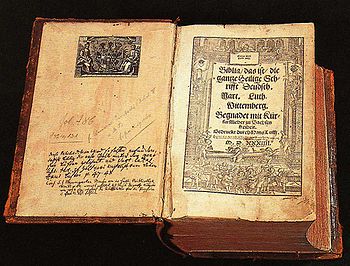While it’s unknown how many atheists use
YouVersion or other Bible
apps, polls show atheists are among the most religiously literate
Americans, topping
Jews,
Mormons and other Christians in a 2010
Pew
Research Center poll.
Atheists seem to use a Bible App containing the
Christian Scriptures which they can quote to have the Christians “tripped up”. Christians seemed to be sitting at the
bottom of the knowledge rung, having been topped not only by atheists
but by Jews and Mormons as well.
The Pew Forum gives that on average, Americans correctly answer 16 of the 32 religious knowledge
questions. Atheists and agnostics average 20.9 correct answers.
Jews and Mormons do about as well, averaging 20.5 and 20.3 correct
answers, respectively.
Protestants as a whole average 16 correct
answers; Catholics as a whole, 14.7. Atheists and agnostics, Jews and
Mormons perform better than other groups on the survey even after
controlling for differing levels of education.
On questions about
Christianity – including a battery of questions about
the Bible – Mormons (7.9 out of 12 right on average) and white
evangelical Protestants (7.3 correct on average) show the highest levels
of knowledge. Jews and atheists/agnostics stand out for their knowledge
of other world religions, including Islam, Buddhism, Hinduism and
Judaism; out of 11 such questions on the survey, Jews answer 7.9
correctly (nearly three better than the national average) and
atheists/agnostics answer 7.5 correctly (2.5 better than the national
average). Atheists/agnostics and Jews also do particularly well on
questions about the role of religion in public life, including a
question about what the
U.S. Constitution says about religion.
More than four-in-ten Catholics in the
United States (45%) do not
know that their church teaches that the bread and wine used in Communion
do not merely symbolize but actually become the body and blood of
Christ. About half of Protestants (53%) cannot correctly identify
Martin
Luther as the person whose writings and actions inspired the
Protestant
Reformation, which made their religion a separate branch of
Christianity. Roughly four-in-ten Jews (43%) do not recognize that
Maimonides, one of the most venerated rabbis in history, was Jewish.
In addition, fewer than half of Americans (47%) know that the
Dalai
Lama is Buddhist. Fewer than four-in-ten (38%) correctly associate
Vishnu and Shiva with Hinduism. And only about a quarter of all
Americans (27%) correctly answer that most people in Indonesia – the
country with the
world’s largest Muslim population – are Muslims.
Other findings of the U.S. Religious Knowledge Survey include:
- On world religions other than Christianity, about six-in-ten
Americans (62%) know that most people in India are Hindus. About half
know that Ramadan is the Islamic holy month (52%) and can name the Koran
as the Muslim holy book (54%). Roughly one-third (36%) correctly
associate striving for nirvana with Buddhism.
 |
| Two Missionaries of . (Photo credit: Wikipedia) |
Around four-in-ten Americans know that the Mormon religion was
founded sometime after 1800 (44%) and that the Book of Mormon tells the
story of Jesus appearing to people in the Americas (40%). About half
(51%) correctly identify Joseph Smith, founder of the Church of Jesus
Christ of Latter-day Saints, as a Mormon.
- In addition to questions about religious knowledge, the survey
included nine general knowledge questions (on history, politics, science
and literature) for comparison purposes. These show, for example, that
about six-in-ten Americans can name the vice president of the United
States (59%) and understand that lasers do not work by focusing
sound waves (60%). More than seven-in-ten (72%) correctly associate
Susan B. Anthony with the movement to give women the right to vote,
while just 42% know that Herman Melville was the author of the novel Moby Dick.
- Overall, people who score well on the general knowledge questions
also tend to do well on the religion questions. Atheists/agnostics and
Jews correctly answer an average of roughly seven of the nine general
knowledge questions. Among the public overall, the average respondent
correctly answers 5.2 of these general knowledge questions.
- While people with a high level of religious commitment do better
than average on the religion questions, people with low levels of
religious commitment do better than average on the general knowledge
questions.
- Many Americans are devoted readers of Scripture: More than a third
(37%) say they read the Bible or other Holy Scriptures at least once a
week, not counting worship services. But Americans as a whole are much
less inclined to read other books about religion. Nearly half of
Americans who are affiliated with a religion (48%) say they “seldom” or
“never” read books (other than Scripture) or visit websites about their own religion, and 70% say they seldom or never read books or visit websites about other religions.
- Mormons, black Protestants and white evangelicals are the most
frequent readers of materials about religion. Fully half of all Mormons
(51%) and roughly three-in-ten white evangelicals (30%) and black
Protestants (29%) report that they read books or go online to learn
about their own religion at least once a week. Only a small
fraction of all religiously affiliated Americans – 6% of the general
public and no more than 8% of any religious group – say they read books
(other than Scripture) or visit websites to learn about religions other than their own at least once a week.












